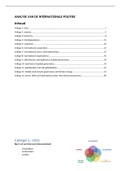ANALYSE VAN DE INTERNATIONALE POLITIEK
Inhoud
College 1: intro......................................................................................................................................1
College 2: anarchy.................................................................................................................................2
College 3: hierarchy...............................................................................................................................8
College 4: interdependence.................................................................................................................15
College 5: capitalism............................................................................................................................20
College 6: international cooperation...................................................................................................27
College 7: international norms, international law...............................................................................37
College 8: international organizations:................................................................................................45
College 9: effectiveness and legitimacy of global governance.............................................................54
College 10: new forms of global governance.......................................................................................59
College 11: globalization and anti-globalization..................................................................................67
College 12: Global environment governance and climate change.......................................................74
College 13: power shifts and international order: theoretical perspectives........................................82
College 1: intro
Big C’s of our time (are interconnected)
- Competition
- Contestation
- Conflict
1
, - (extensive) cooperation
- Climate change
Think critically about IP
- Be skeptical of official explanation and mass beliefs
- What’s really going on here?
- Why is such and such happening (in this way)?
- What else is possible?
- Why isn’t … happening
Don’t believe theories, use them!
- Why does … keep happening?
- Under what conditions does … happen?
- How does … influence …?
- What is likely to happen next?
- Is a hammer a good tool? well it is good for some jobs theories are like tools
Theories of IP evolve over time, new theories emerge… but they don’t obsolete after a few years
they are not like mobile phones.
Focus mainly on explanation
- Why-question
- Under-what-condition-question
Why does international cooperation and problem-solving sometimes succeed, and sometimes fail?
Why and under what conditions do states (not) follow international rules?
Why can’t international organizations more easily act independently of states? Under what
conditions can they?
Why (and how) are emerging powers and non-state actors reshaping global governance?
College 2: anarchy
Assigned reading: Alexander Wendt (1992). Anarchy Is What States Make of It: The Social
Construction of Power Politics. International Organization 46(2), 391-425
Summary reading:
2
,The article argues that international relations and the behavior of states are not determined solely
by the anarchical nature of the international system but by the social constructs that states create
and maintain within it.
The author contends that the way states understand and interpret their relationships with each
other is shaped by the social norms, ideas, and identities that they hold, rather than solely by the
structure of the international system. According to Wendt, the behavior of states is based on their
beliefs about the world and their relationships with other states, which in turn, shape their actions.
Wendt proposes three different kinds of international systems: Hobbesian, Lockean, and Kantian. A
Hobbesian system is one where states perceive each other as enemies and engage in self-help and
competition for power. A Lockean system is one where states acknowledge the need for cooperation
and develop common rules and institutions to maintain peace and stability. Finally, a Kantian system
is one where states share a common identity and norms, which lead to high levels of cooperation
and peace.
The author concludes that the international system is not just a structure but a social construct, and
therefore, states can change their perceptions and behavior by transforming their social norms and
beliefs. This article has been influential in the development of constructivist theories in international
relations, which emphasize the role of norms, ideas, and identities in shaping state behavior.
Lecture:
International system
- Many types of ‘actors’… but they don’t float freely
o States (governments, ministries, etc.)
o Sub-national bodies (regions, cities, etc.)
o Inter-governmental organizations (regional or functional) like EU (regional)
o Non-governmental organizations (NGO’s)
o Multi-national corporations/business/firms
o Transnational networks (advocacy networks, terrorist networks, other)
- They co-exist within a larger system that structures them and their interactions in particular
ways.
- International system: a set of incentives and expectations that shape the identities and
behaviors of states and other actors in international politics
o Why study it? because it has effect that cannot be explained simply by examining
the actor and organization themselves!
o But there are multiple concepts (understandings) of the international system!
- 4 concepts of the ‘international system’
1. Anarchy
2. Hierarchy
3. Interdependence
4. Capitalism
What are the dynamics of the international system (that cannot be attributed simply to the
preferences of the actors and organization within it)?
What do the parts have in common, and what distinguishes them?
Anarchy
: the absence of effective central authority
3
, - International anarchy: the absence of effective central authority above states and other
actors
- Mearsheimer 2001: ‘there is no government above governments’
- Anarchy is not the same as chaos therefore anarchy and order may co-exist!
- UN is club of states, not authority above states
- International anarchy: the absence of effective authority above states:
- Some states are bigger/more powerful than others
- The ‘billiard ball’ model of IR
o International system is just a bunch of balls, bouncing into each other
- Three interpretations of the same concept
1. Anarchy 1.0: self-help, security dilemmas, the distribution of power
All states will more or less act the same way, no matter what kind of state
you are
Assumes defensive intentions
Assumes states are NOT aggressive
4





